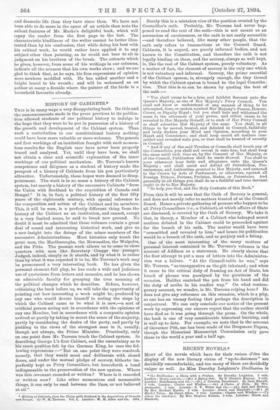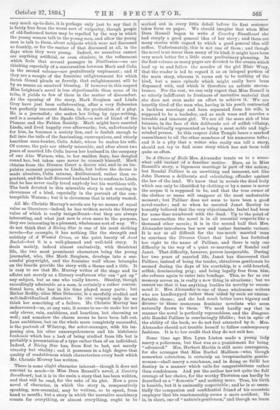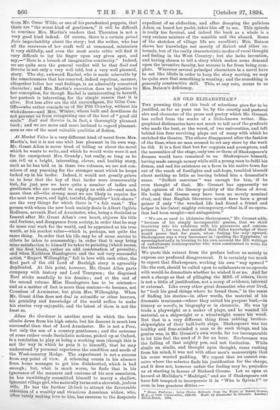RECENT NOVELS.* Mpsm of the novels which have for their
raison d'are the display of the new literary virtue of "up-to-dateness" are decidedly uncomfortable, and too many of them are decidedly vulgar as well. As Miss Dorothy Leighton's Disillusion is
* IL) Disillusion: a Story with a Preface. By Dorothy Leighton. 3 vols. London: Henry and Co.—(2.) A Rising Star. By D Christie Murray. 3 vols. London: Hutchinson and Co.—(3.) A Country Sweetheart. By Dora Russell. 3 vols. London : Chatto and Winclns.—(4.) A Choice of Evils. By Mrs. Alexander. 3 vols. London : F. V. White and Co.—(5.) Suit and Service. By Mrs. Herbert Martin. 2 vols. London: Hurst and Blaekett.—(6 ) At Market Value. By Grant Allen. 2 vols. London: Clhatto and Windus.-17.1 Adam the Gardentr. By Mrs. Stephen Batson. 2 vole. London: Hurst and Blaekett.
very much up-to-date, it is perhaps only just to say that it is fairly free from the worst sort of vulgarity, though people of old-fashioned tastes may be repelled by the way in which the young women talk to the young men, and allow the young men to talk to them, about subjects which were not discussed so frankly, or for the matter of that discussed at all, in the days when they were young. Indeed, we ourselves cannot see anything artificial, or even obsolete, in the refinement which feels that several passages in Dieiliusion—we are thinking especially of a conversation between Mark and Celia in the second volume—are gratuitously unpleasant ; and if they are a sample of the feminine enlightenment for which Sarah Grand pleads so fiercely, that enlightenment will be by no means an unmixed blessing. If however in this reepact Miss Leighton's novel is less objectionable than some of its tribe, it yields to few of them in the matter of discomfort. At the opening of the story, Mark Sergison and Linda Grey have just been collaborating, after a very Bohemian but perfectly innocent fashion, in the production of a play. lie is a journalist; she makes her living by type-writing, and is a member of the Spade Club,—a sort of blend of the Pioneer and the Fabian Society. Mark might have married Linda, and lived happily ever afterwards ; but, unfortunately for him, he becomes a society lion, and is foolish enough to fall into the toils of the fascinating, unscrupulous, and utterly heartless man-hunter, Celia Adair, whom he makes his wife. Of course, the pair are utterly miserable, and after about two years of married life Celia leaves her husband in the company of one Alec Watson, who, in her maiden days, has dangled round her, but taken care never to commit himself. Mark obtains from the Divorce Court a decree nisi, and in an im- pulsive moment proposes to Linda, but before the decree is made absolute, Celia returns, disillusioned, rather than re- pentant, and the half-divorced husband has to confess to Linda that he has never really loved anybody but his worthless wife. The book devoted to this miserable story is not wanting in cleverness of a kind, especially in the portrait of the con- temptible Watson ; but it is cleverness that is utterly wasted.
All Mr. Christie Murray's novels are by no means of equal value as literature—indeed, he has written novels the literary value of which is really insignificant—but they are always interesting, and what just now is even more to the purpose, they are interesting in a pleasant, wholesome sort of way. We do not think that A _Rising Star is one of his most striking novels—for example, it has nothing like the strength and subtlety of A Wasted Crime, or the quiet beauty of Aunt Rachel—but it is a well-planned and well-told story. It deals mainly, indeed almost exclusively, with theatrical life, the two most prominent characters being the young journalist, who, like Mark Sergison, develops into a suc- cessful playwright, and the feminine waif whose triumphs on the boards provide the story with a theme and a title. It is easy to see that Mr. Murray writes of the stage and its affairs not merely as a literary craftsman who can "get up any subject, but as one who really knows. Stanley, though exceedingly admirable as a man, is certainly a rather conven- tional hero, who has in his time played many parts ; but Esther Reddy, alias Miss Delacour, is a carefully studied and well-individualised character. In one respect only do we think her something of a failure. Mr. Christie Murray has endeavoured—so, at any rate, it seems to us—to make her not only clever, vain, ambitions, and heartless, but charming as well; and somehow the charm seems to have been left out. Less ambitious, but on the whole more completely successful, is the portrait of Wilstrop, the actor-manager, with his im- posing airs, his utter unscrupulousness and his histrionic bonhomie which has a look of being studied from life but is probably a presentation of a type rather than of an individual, Indeed, A Rising Star has, from first to last, not merely vivacity but vitality ; and it possesses in a high degree that quality of readableness which characterises every book which Mr. Christie Murray has written.
There is some slight character interest—though it does not amount to much—in Miss Dora Russell's novel, A Country Sweetheart; but it is in the main a story that has been written, and that will be read, for the sake of its plot. Now a pure novel of character, in which the story is, comparatively speaking, non-essential, may be written, so to speak, from hand to month; but a story in which the narrative machinery counts for everything, or almost everything, ought to be worked out in every little detail before its first sentence takes form on. paper. We should imagine that when Miss Dora Russell began to write A Country Sweetheart she had simply a good general idea of her story ; and there are many stories with regard to which a good general idea will' suffice. Unfortunately, this is not one of them ; and though the novel is no worse than many of its kind, it might have been very much better for a little more preliminary planning. In the first volume so many pages are devoted to the events which lead up to and follow the murder of the girl Elsie Wray, that the reader is led to regard it as an integral portion of the main story, whereas it turns out to be nothing of the kind, but a mere episode which might easily have been dispensed with, and which is therefore an artistic encum- brance. For the rest, we can only regret that Miss Russell ia so utterly indifferent to freshness of narrative material that she does not even make an effort to achieve it. We are heartily tired of the man who, having in his youth contracted a luckless marriage and been separated from his wife, is supposed to be a bachelor, and as such woos and marries a loveable and innocent girl. We are all the more sick of him because, in the face of this deliberate act of selfish villainy, he is habitually represented as being a most noble and high- minded person. In this respect John Temple bears a marked resemblance to all the other members of his numerous tribe ; and it is a pity that a writer who really can tell a story, should not try to find some story which has not been told quite so often.
In A Choice of Evils Mrs. Alexander treats us to a some- what odd variant of a familiar motive. Here, as in Miss Russell's story, a bigamous marriage is part of the action; but Randal Palliser is an unwitting and innocent, not like John Dawson a deliberate and calculating, offender against the law of the land. We know that in novels the dead body which can only be identified by clothing or by a name is never the corpse it is supposed to be, and that the true owner of the clothes or name will reappear at the most undesirable moment; but 'Palliser does not seem to have been a good novel-reader ; and so when he married Janet Rowley he honestly believed that the very objectionable Isabel had been for some time numbered with the dead. Up to the point of her resurrection the novel is in all essential respects like a thousand other novels ; it is in the second half that Mrs. Alexander introduces her new and rather fantastic variant. It is not at all difficult for the too-much married man to convince the Divorce Court that Isabel has forfeited her right to the name of Palliser, and there is only one difficulty in the way of a quiet re-marriage of Randal and Janet. That difficulty, however, proves insuperable. During her two years of married life, Janet has discovered that Palliser, instead of being the tender, chivalrous gentleman he seemed during the days of his courtship, is a cold-hearted, selfish, domineering prig; and being legally free from him, she refuses again to enter into bondage. This, so far as our memory serves us, is really a new thing in situations ; but we cannot see that it has anything besides its novelty to recom- mend it. Mrs. Alexander is one of those wholesome writers who are handicapped rather than aided by such an uncom- fortable theme; and she had much better leave bigamy and divorce to those numerous feminine novelists who seem naturally drawn to them. We need hardly say that in manner the novel is perfectly reproachless, and the disagree- able Randal Palliser is convincingly lifelike; but in spite of the ability of the book, we do not feel attracted by it. Aim Alexander should not trouble herself to follow contemporary fashions. It is to her credit that they do not suit her.
Some time ago Mrs. Lynn Linton made a young lady marry a policeman, but that was as a punishment for being "advanced." Mrs. Herbert Martin is still more courageous, for she arranges that Miss Rachel Mallison—who, though somewhat colourless, is certainly an irreproachable gentle- woman—shall marry a coachman, and in doing so fulfil her destiny in a manner which calls for congratulations rather than condolences. And yet the author has not quite the full courage of her choice, for the worthy Thornton can hardly be described as a "domestic" and nothing more. True, his birth is humble, but it is eminently respectable ; and he is so essen- tially the companion and confidential friend of his eccentric employer that his coachmanship seems a mere accident. He is, in short, one of "nature's gentlemen," and though we learn from Mr. Oscar Wilde, or one of his paradoxical puppets, that these are "the worst kind of gentlemen," it will be difficult to convince Mrs. Martin's readers that Thornton is not a very good kind indeed. Of course, there is a certain prima facie improbability about the story ; but the writer, who has all the resources of her craft well at command, minimises it very skilfully, and even the most acute critic will find it very difficult to lay his finger upon any given spot, and say,—" Here is a breach of imaginative continuity." Indeed, we are quite sure the general verdict will be that Suit and Service is not only a very well told, but a very well planned, story. The shy, awkward Rachel, who is made miserable by the consciousness that her reserved, indeed repellent, manner, altogether belies her real feelings, is an admirably conceived character; and Mrs. Martin's execution does no injustice to her conception, for though Rachel is uninteresting in herself, her portrait is interesting, for the simple reason that it is alive. Not less alive are the old curmudgeon, Sir Giles Gun- life—who rather reminds us of Sir Pitt Crawley, without his wickedness—and Mrs. Winter, whose bulk and dowdiness do not prevent us from recognising one of the best of good old souls." Suit and Service is, in fact, a thoroughly pleasant book; and we are more and more inclined to regard pleasant- ness as one of the most valuable qualities of fiction.
Al Market Value is a very different kind of novel from Mrs. Martin's, but it is not one whit less pleasant in its own way. Mr. Grant Allen is never tired of telling us about the novel which he wants to write, and which he would write were it not for the omnipotent Mrs. Grundy ; but really, so long as he can tell us a bright, interesting, clever, and healthy story, such as he has told us in these two volumes, we are not con- scious of any yearning for the stronger meat which he keeps locked up in his larder. Indeed, it would not greatly grieve cis to hear that the key of that larder were irrecoverably lost, for just now we have quite a number of ladies and gentlemen who are careful to supply us with all—and much more than all—the strong meat we are likely to require for the next ten years, and light, tasteful, digestible' kick-shaws" are the very things for which there is a felt want." The person with whom the new book mainly deals is Albert Ogilvie Redburn, seventh Earl of Axminster, who, being a Socialist or Isocrat after Mr. Grant Allen's own heart, abjures his title and fortune, and disappears from society, in order that he may do some real work for the world, and be appraised at his true worth, or his market value—which is, perhaps, not quite the same thing. In order that his life may be of some service to others he takes to seamanship ; in order that it may bring some satisfaction to himself he takes to painting (which seems, at the first blush, rather an odd combination of pursuits); and when Kathleen Hasslegrove and the not very successful artist, "Rupert Willoughby," fall in love with each other, the e rot part of the old Lord of Burleigh story is agreeably duplicated. At this point, however, Mr. Grant Allen parts Company with history and Lord Tennyson; the disguised Earl sticks manfully to his domino ; and at the end of the second volume Miss Hasslegrove has to be content— and as a matter of fact is more than content—to become, not Countess of Axminster, but plain Mrs, Willoughby. When Mr. Grant Allen does not deal in scientific or other horrors, his geniality and knowledge of the world suffice to make his stories very enjoyable, and the latest of them is not the least so.
Adam the Gardener is another novel in which the hero climbs down from his high estate, but his descent is much less successful than that of Lord Axminster. He is not a Peer, but only the son of a country gentleman ; and the outcome of some rather crude Socialistic notions, picked up at Oxford, is a resolution to play at being a working man (though this is not the way in which he puts it to himself), that he may ;anderstand by personal experience the condition and needs of the West-country Hodge. The experiment is not a success from any point of view. A scheming cousin in his absence from home manages to get him disinherited, which is bad enough ; but, what is much worse, he finds that in his ignorance of the manners and customs of his new associates, be has unwittingly committed himself to marry a shallow, ignorant village girl, who naturally turns out a shrewish, jealous wife. He has the further ill-luck to attract the favourable attention of a wealthy and vivacious American widow, who, after vainly making love to him, has recourse to the desperate expedient of an abduction, and after decoying the guileless Adam on board her yacht, takes him off to sea. This episode is really too farcical, and indeed the book as a whole is a very curious mixture of the sensible and the absurd. Some of the sketches of village life are excellent; Mrs. Batson shows her knowledge not merely of dialect and other ex- ternals, but of the really characteristic modes of rural thought and feeling in the West Country ; but she lacks invention, and having chosen to tell a story which makes some demand upon the inventive faculty, her success is far from being com- plete. Wherever several principal characters in a novel have to act like idiots in order to keep the story moving, we may be quite sure that something is wanting; and the something is generally constructive skill. This, at any rate, seems to us Mrs. Batson's deficiency.








































 Previous page
Previous page